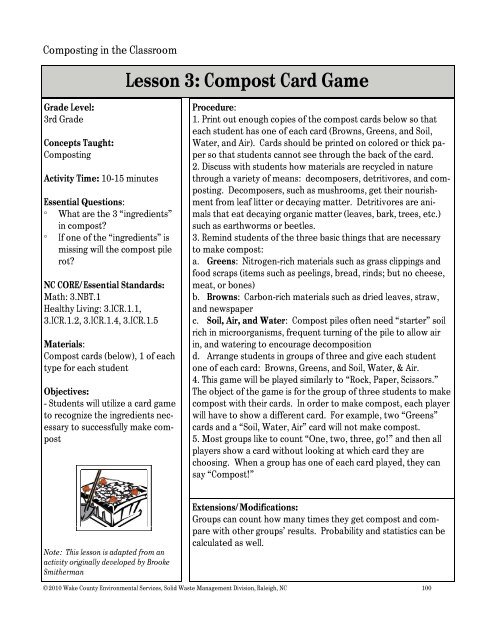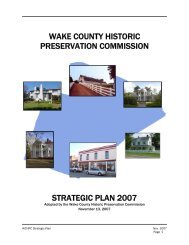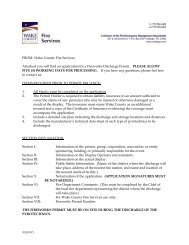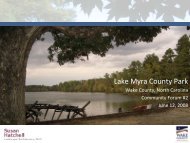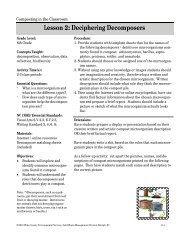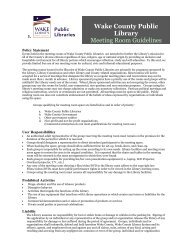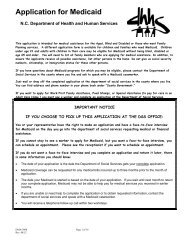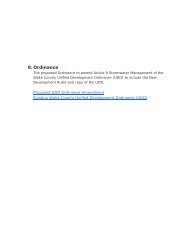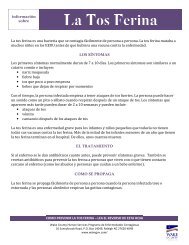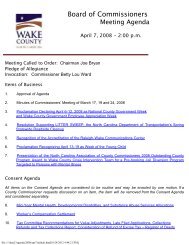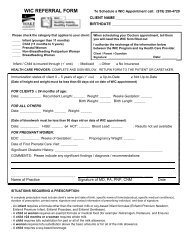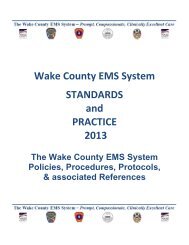Lesson 3: Compost Card Game - Wake County Government
Lesson 3: Compost Card Game - Wake County Government
Lesson 3: Compost Card Game - Wake County Government
Create successful ePaper yourself
Turn your PDF publications into a flip-book with our unique Google optimized e-Paper software.
<strong>Compost</strong>ing in the Classroom<br />
<strong>Lesson</strong> 3: <strong>Compost</strong> <strong>Card</strong> <strong>Game</strong><br />
Grade Level:<br />
3rd Grade<br />
Concepts Taught:<br />
<strong>Compost</strong>ing<br />
Activity Time: 10-15 minutes<br />
Essential Questions:<br />
What are the 3 “ingredients”<br />
in compost<br />
If one of the “ingredients” is<br />
missing will the compost pile<br />
rot<br />
NC CORE/Essential Standards:<br />
Math: 3.NBT.1<br />
Healthy Living: 3.ICR.1.1,<br />
3.ICR.1.2, 3.ICR.1.4, 3.ICR.1.5<br />
Materials:<br />
<strong>Compost</strong> cards (below), 1 of each<br />
type for each student<br />
Objectives:<br />
- Students will utilize a card game<br />
to recognize the ingredients necessary<br />
to successfully make compost<br />
Procedure:<br />
1. Print out enough copies of the compost cards below so that<br />
each student has one of each card (Browns, Greens, and Soil,<br />
Water, and Air). <strong>Card</strong>s should be printed on colored or thick paper<br />
so that students cannot see through the back of the card.<br />
2. Discuss with students how materials are recycled in nature<br />
through a variety of means: decomposers, detritivores, and composting.<br />
Decomposers, such as mushrooms, get their nourishment<br />
from leaf litter or decaying matter. Detritivores are animals<br />
that eat decaying organic matter (leaves, bark, trees, etc.)<br />
such as earthworms or beetles.<br />
3. Remind students of the three basic things that are necessary<br />
to make compost:<br />
a. Greens: Nitrogen-rich materials such as grass clippings and<br />
food scraps (items such as peelings, bread, rinds; but no cheese,<br />
meat, or bones)<br />
b. Browns: Carbon-rich materials such as dried leaves, straw,<br />
and newspaper<br />
c. Soil, Air, and Water: <strong>Compost</strong> piles often need “starter” soil<br />
rich in microorganisms, frequent turning of the pile to allow air<br />
in, and watering to encourage decomposition<br />
d. Arrange students in groups of three and give each student<br />
one of each card: Browns, Greens, and Soil, Water, & Air.<br />
4. This game will be played similarly to “Rock, Paper, Scissors.”<br />
The object of the game is for the group of three students to make<br />
compost with their cards. In order to make compost, each player<br />
will have to show a different card. For example, two “Greens”<br />
cards and a “Soil, Water, Air” card will not make compost.<br />
5. Most groups like to count “One, two, three, go!” and then all<br />
players show a card without looking at which card they are<br />
choosing. When a group has one of each card played, they can<br />
say “<strong>Compost</strong>!”<br />
Note: This lesson is adapted from an<br />
activity originally developed by Brooke<br />
Smitherman<br />
Extensions/Modifications:<br />
Groups can count how many times they get compost and compare<br />
with other groups’ results. Probability and statistics can be<br />
calculated as well.<br />
©2010 <strong>Wake</strong> <strong>County</strong> Environmental Services, Solid Waste Management Division, Raleigh, NC 100
<strong>Compost</strong>ing in the Classroom<br />
©2010 <strong>Wake</strong> <strong>County</strong> Environmental Services, Solid Waste Management Division, Raleigh, NC 101


